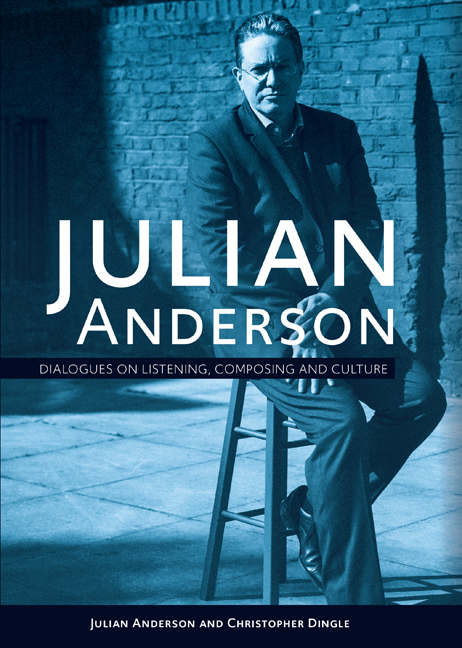Book contents
- Frontmatter
- Contents
- List of Illustrations
- Foreword
- Acknowledgements
- Introduction
- Prelude – Jeux: A Conversation Over Lunch
- Conversation One Origins
- Conversation Two Enthusiasms
- Conversation Three Training
- Conversation Four Dance
- Conversation Five Folk
- Conversation Six Composing (or Not)
- Conversation Seven Understandings
- Conversation Eight Beginnings (and Endings)
- Conversation Nine Puzzles
- Conversation Ten Singing
- Conversation Eleven Olly
- Conversation Twelve Memory
- Conversation Thirteen Opera
- Conversation Fourteen Practices
- Conversation Fifteen Outsiders?
- Conversation Sixteen Quartets
- Conversation Seventeen Advocacy
- Conversation Eighteen Partnerships
- Coda: Multiple Choices
- Chronology
- List of Personae
- Glossary of Musical Terms
- Macrotonality
- Catalogue of Published Works by Julian Anderson
- List of Recordings of Julian Anderson’s Music
- Bibliography
- Discography
- Index
Conversation Seven - Understandings
Published online by Cambridge University Press: 16 September 2020
- Frontmatter
- Contents
- List of Illustrations
- Foreword
- Acknowledgements
- Introduction
- Prelude – Jeux: A Conversation Over Lunch
- Conversation One Origins
- Conversation Two Enthusiasms
- Conversation Three Training
- Conversation Four Dance
- Conversation Five Folk
- Conversation Six Composing (or Not)
- Conversation Seven Understandings
- Conversation Eight Beginnings (and Endings)
- Conversation Nine Puzzles
- Conversation Ten Singing
- Conversation Eleven Olly
- Conversation Twelve Memory
- Conversation Thirteen Opera
- Conversation Fourteen Practices
- Conversation Fifteen Outsiders?
- Conversation Sixteen Quartets
- Conversation Seventeen Advocacy
- Conversation Eighteen Partnerships
- Coda: Multiple Choices
- Chronology
- List of Personae
- Glossary of Musical Terms
- Macrotonality
- Catalogue of Published Works by Julian Anderson
- List of Recordings of Julian Anderson’s Music
- Bibliography
- Discography
- Index
Summary
This conversation broadly is an attempt to understand what is going on now in much of composition. Inevitably, there are no firm conclusions, for it is like trying to hold smoke, but it raises various issues with our perception of any music. A key thread from the start is whether there is a broad term for what a significant tranche of composers has been doing since the latter part of the twentieth century. The importance of Messiaen's example is outlined and Anderson discusses how his understanding of that, along with parts of The Rite of Spring, led to his use of multi-register scales in Khorovod, and how it is also how he hears a range of other music. After noting the aesthetic of free improvisation and performances of musical graphics, and the restrictive approaches of some in the latter part of the twentieth century, the possibility of a non-technical term to encapsulate the more open musical approach prompts discussion of the term ‘decorative’. Negative perceptions in Britain of French culture lead to noting the not entirely positive impact of the progressive canon promulgated by Messiaen and the restricted range of influences deemed acceptable by the following generations, after which the conversation returns to terminology with terms such as Impressionist and Classical and composers talking about their own music.
JA: We had German reviews for Thebans last week, which, as usual, I haven't read myself, but Schott told me about them. One of the phrases that apparently came up was, ‘It's not avant-garde music. It's not traditional music. What is it?’ That amuses me. I’ve been trying to answer that question ever since I started. That reviewer seems to me to have put their finger on something. Perhaps it's just music, and people have a lot of trouble with that.
CD: There are various people, starting with some of the bigger late-twentieth-century names – Messiaen being an obvious case – where what they’re doing is not tonal, it's certainly not serial, it's certainly not atonal. It really ranges between aspects of all of those things and other things as well and it raises the question of how should we refer to it?
JA: That's why Messiaen started talking about colours in his music so much, surely.
- Type
- Chapter
- Information
- Julian AndersonDialogues on Listening, Composing and Culture, pp. 133 - 152Publisher: Boydell & BrewerPrint publication year: 2020



